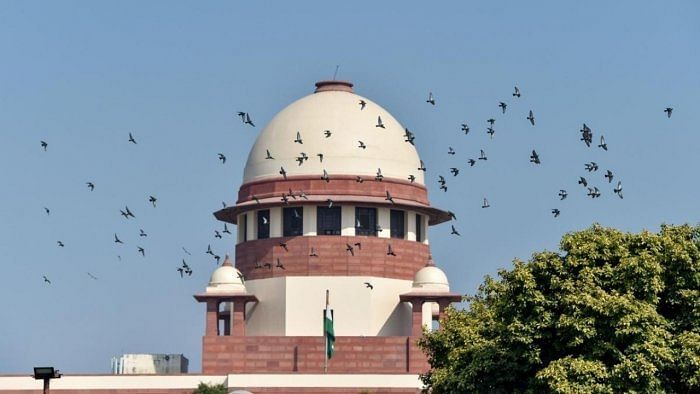
"Journalists are not terrorists", the Supreme Court said on Monday, as it deprecated the Jharkhand police knocking on the door of a scribe of a local Hindi news channel at midnight and dragging him out of his bedroom before placing him under arrest in an extortion case.
Calling the police action "excesses of the state", the top court said it seems that "complete lawlessness" is prevailing in Jharkhand.
A bench of Justices D Y Chandrachud and Hima Kohli refused to interfere with an order of the Jharkhand High Court granting interim bail to the journalist and said it will not entertain the state's appeal.
"We have seen the facts of the case. These are all excesses of the State and it seems complete lawlessness is prevailing in Jharkhand. No, we are not going to interfere with the High Court order.
"You knock at the door of a journalist at midnight and pull him out from his bedroom. This is too much. You are dealing with a person who is a journalist and journalists are not terrorists," the bench told Jharkhand's additional advocate general Arunabh Choudhary, voicing strong displeasure over the incident.
The top court said the high court rightly granted interim bail to the journalist by a detailed order which does not warrant any interference.
"Sorry, we are not going to entertain your plea. Since it is an interim order and matter is pending there, you go and convince the High Court," the judges told Choudhary and disposed of the plea.
Choudhary alleged journalist Arup Chatterjee was involved in blackmail and extortion activities and a criminal case had been lodged against him.
When the bench asked him about how long Chatterjee was lodged in jail, Choudhary said he was there for two to three days.
"He is lucky that he was out in three days as many people like him have to spend two-three months in jail (before being enlarged on bail)," the bench said.
The Jharkhand government had approached the top court against the bail granted to Chatterjee by the high court on July 19.
The Jharkhand High Court, while granting interim bail to Chatterjee on a plea field by his wife, had said after getting a response from the State to her plea the court will consider if senior Dhanbad police officials including the SP are required to be issued notices for contempt of court in the light of the apex court's observations in Arnesh Kumar (2014) and DK Basu (1997) judgements in which guidelines had been laid down for the arrest of individuals.
Baby Chatterjee, the wife of Arup Chatterjee who is a director at the channel, had moved the high court, claiming her husband was arrested at 12:20 am on the intervening night of July 16-17, 2022 from their Ranchi apartment in violation of the provisions of the CrPC.
The high court had said in its order, "Prima facie, it appears that the procedure prescribed under Sections 80 and 81 CrPC has not been followed in the case in hand. These two provisions provide that once the arrest is made beyond 30 km of the concerned court, the local Magistrate and the police are required to be informed, which has not been done in the case in hand.
"Moreover, the arrest has been made after the sunset and that too from the bedroom of Arup Chatterjee, who is accused. This is again in violation of the guidelines of the judgment (of the apex court)".
The high court had also said that prima facie it appears the directions of the Supreme Court in the case of Arnesh Kumar and D.K. Basu had not been followed. In those cases, the Supreme Court had gone to the extent of ruling that if the directions were not followed by police officials, contempt proceedings can be initiated against the erring officer(s) in the high court having territorial jurisdiction.
"The petitioner (Arup Chatterjee) has been arrested without following the procedure prescribed under Sections 80 and 81 CrPC and not produced before the court of any Magistrate at Ranchi. It appears that the procedure prescribed under CrPC has been violated", the Jharkhand High Court held.
Chatterjee was arrested by Dhanbad police in a case registered at Govind Pur police station for alleged extortion.